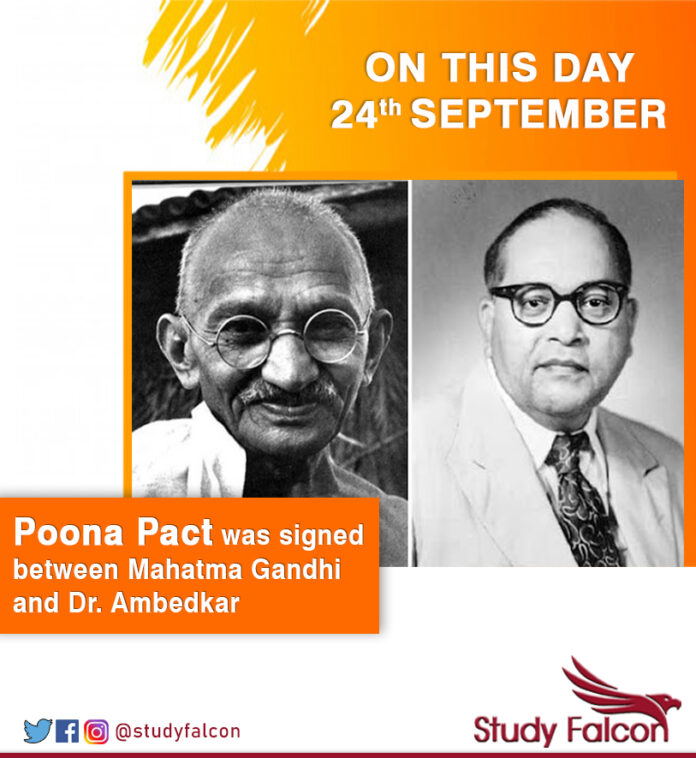An agreement between Dr. Babasaheb Ambedkar and Mahatma Gandhi was signed 88 years ago on September 24, 1932. The agreement was signed by Pt Madan Mohan Malviya and Dr. B. R. Ambedkar and some Dalit leaders at Yerwada Central Jail in Pune, to break Mahathma Gandhi’s fast unto death.
Poona Pact, was an agreement between Hindu leaders in India granting new rights to Dalits. In 1932, the Britishers announced ‘The Communal Award’ which was considered as one of the tools of divide and rule in India. Mahatma Gandhi understood their move and knew that this was an attack on Indian nationalism. Therefore, Mahatma Gandhi went on a hunger strike and objected to the provision of separate electorates for the Dalits. Gandhi opposed the British since he felt that their policies would divide the Hindu society. Dalit leaders, especially Bhimrao Ramji Ambedkar, supported the proposal, believing it would allow Dalits to advance their interests. Ambedkar refused to abandon his support for separate electorates until Gandhi was near death. He and the Hindu leaders then agreed to the pact, which declined separate electorates but gave increased representation to the Dalits within the Hindu electorate for a 10-year period. Ambedkar complained of blackmail, but the pact marked the start of the movement against “untouchability” within the Indian nationalist movement.

In a settlement negotiated with Gandhi, Ambedkar agreed for depressed class candidates to be elected by a joint electorate. However, on his insistence, slightly over twice as many seats (147) were reserved for the depressed classes in the legislature than what had been allotted under the Communal Award. In addition, the Poona Pact assured a fair representation of the depressed classes in the public services while earmarking a portion of the educational grant for their uplift.
The Poona Pact was an emphatic acceptance by upper-class Hindus that the depressed classes constituted the most discriminated sections of Hindu society. It was also conceded that something concrete had to be done to give them a political voice as well as a leg-up to lift them from a backwardness they could not otherwise overcome. The Poona Pact had several positive outcomes for Ambedkar. It emphatically sealed his leadership of the depressed classes across India. He made the entire country, and not just the Congress Party, morally responsible for the uplift of the depressed classes. Most of all he succeeded in making the depressed classes a formidable political force for the first time in history.

Below are some of the terms of the Poona Pact:
- Seat reservation for the Scheduled Castes (SC) and Scheduled Tribes (ST) in provincial legislature
- The STs and SCs would form an electoral college which would elect four candidates for the general electorate
- The representation of these classes was based on the standards of joint electorates and reserved seats
- About 19 per cent of seats were to be reserved for these classes in legislature
- The system of election to the panel of candidates in both, Central and Provincial Legislature should come to end in 10 years, unless it ends on mutual terms
- The representation of the classes through reservation should continue as per clauses 1 and 4 until determined, else by mutual agreement between the communities
- The franchise for the Central and Provincial Legislatures of these classes should be indicated in the Lothian Committee report
- There should be a fair representation of these classes
- In every province, the SCs and STs should be provided with sufficient educational facilities.
The Poona Pact is a very short document written a quasi-legal style. It contained nine points, seven of which laid out the manner and quantum of representation of the Depressed Classes at the central and provincial legislatures. Separate electorates for Depressed Classes did not feature in any of the document, instead, the Pact put forward a system of the joint electorates with reserved seats. It reserved 148 seats from the general electorate for Depressed Classes, 78 more than what the Award had proposed.

The Pact also called for the non-discrimination of Depressed Classes in public services and urged for efforts towards the fair representation of the community in public services. It also contained a provision that proposed the earmarking of a portion of the state’s educational grant for Depressed Classes.
The Pact was sent across to British authorities who then set aside the sections dealing with untouchables. Promptly, Gandhi broke his fast on 26th September 1932. The Pact influenced the Government of India Act, 1935, separate electorates were given to Muslims, Sikhs and others, but not to the Depressed Classes.
The Pact was a historic moment in India’s constitutional and political history. It brought to bear the tensions between and the Depressed Classes and the Hindus, one that would continue to haunt the freedom movement and negotiations between Indians and the British. To a large extent, the Pactfurther reinforced and augmented the claim that Depressed Classes were a political minority whose interests could not be ignored while drawing up the constitutional future of India.










